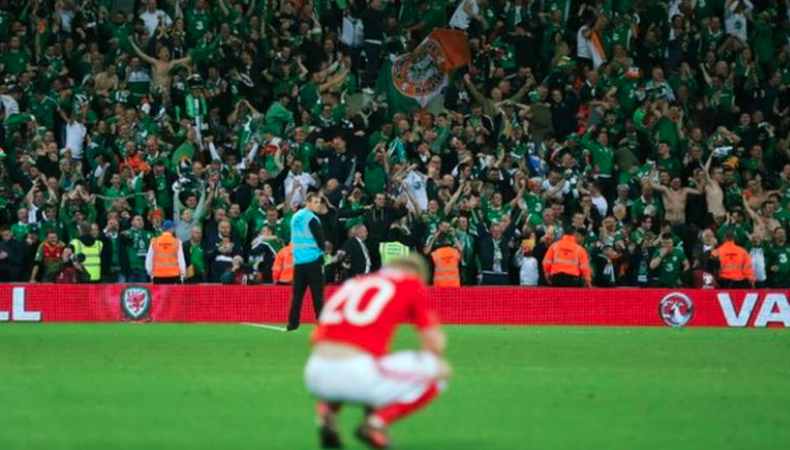THE FAW have gone all out with the official video for their World Cup anthem, Yma o Hyd.
The FAW could have just concentrated on the song’s catchy music and the fact that its followers enjoyed singing it during games, ignoring the song’s message entirely.
They have, however, completely embraced the openly political idea of Dafydd Iwan’s song and all the layers of meaning and interpretation of Welsh history that come along with it in this video by using historical and archival material.
There are some contentious aspects to this. Remember that Yma o Hyd was an anti-establishment protest song when it was initially released at the turn of the 1980s.
The author was at the front of a protest movement and going through a divorce when he wrote this, and he also regarded the political climate in Wales under the Conservative administration as a moment of upheaval.
Both the song and the video use opposition to the British establishment as a way to explain what it means to be Welsh.
The video itself narrates two tales: the birth of a Welsh country and the 64-year quest of the Welsh football team to reach a World Cup.
Similarities are also encouraged here. Both of them have overcome tremendous obstacles. It’s true that they’ve both had setbacks. But in the end, they managed to come out on top.

By watching the video from beginning to end, we can see that it presents a very narrow perspective of Welsh political and historical events.
No one remembers Macsen, and you don’t either. At the outset, Dafydd Iwan provides the narration while a manuscript with a portrait of Macsen Wledig emerges on screen.
Welsh legend credits Macsen Wledig, also known as Magnus Maximus, with liberating Wales from Roman occupation.
The implication here is that Welsh independence was once achieved but has since been lost.
‘1,600 years is a time too old to remember.’
In academic parlance, this may be called a “primordialist” conception of the nation-state; that is, the belief that Wales has always existed or is waiting to be born but has been suppressed.
This is followed by archival video of the protests that have shaped Wales’ path to independence.
We see Dafydd Iwan, a political activist from the 1960s, emerge from jail after serving time for his activism, and we see a demonstration against the flooding of Capel Celyn and the flooding of the valley itself.
Video of a republican demonstration against Prince Charles (now King) at the Urdd Eisteddfod in Aberystwyth in 1969 is perhaps the most politically contentious thing we witness.
Dafydd Iwan, of course, was a major voice in the opposition to the 1969 investiture, an event with renewed political importance.
Afterwards, we see video from the General Strike and the Miners’ strike in the 1980s, set to Dafydd Iwan’s rendition of “er gwaetha’r hen Fagi a’i chriw” (despite Margaret Thatcher and her followers).

Photos of the unveiling of the statue of Nye Bevan, Gwynfor Evans, and Betty Campbell in Cardiff, a march by the LGTB rainbow wall, and Ron Davies’s proclamation of the beginning of Welsh devolution follow.
This interpretation of Welsh history is strongly associated with the political left, the republican movement, support for devolution, and progressive and patriotic sentiments. Overall, the message is about as subtle as Paul Mullin’s boots.

Clips depicting Wales’ footballing failures, such as Paul Bodin missing a penalty kick that would have sent Wales to the World Cup in 1993, are interspersed throughout.
We also have video of the actual moment of victory, when Dafydd Iwan rallies the Welsh team in the World Cup qualifying final and the Welsh team and their fans celebrate their success.
The video is a celebration of not just the Welsh team’s success in qualifying for the World Cup, but also of the resurgence of Welsh pride and identity that the team’s success represents.
And on a more personal note, Dafydd Iwan’s own previously minority sense of Welshness becomes regarded as mainstream, as he appears in the film at different ages and involved in different causes.
The song gently achieves the same goal by using not only Dafydd Iwan’s voice but that of the entire Red Wall singing along.
This creates the sense that the entire Welsh country is now singing what was once a solitary tune.
Overall, the video is about as brazenly political as it gets, drawing a clear line between the political tyranny of Wales and the country’s ups and downs on the football field.
It sees the struggle of the Welsh people for equality and respect throughout history as a continuous uphill battle, but one that will end in victory if we persevere as a country.

In short, it’s a far cry from the goat-cam and pyrotechnics presented by the Welsh Rugby Union on match day.Clips depicting Wales’ footballing failures, such as Paul Bodin missing a penalty kick that would have sent Wales to the World Cup in 1993, are interspersed throughout.
We also have video of the actual moment of victory, when Dafydd Iwan rallies the Welsh team in the World Cup qualifying final and the Welsh team and their fans celebrate their success.
The video is a celebration of not just the Welsh team’s success in qualifying for the World Cup, but also of the resurgence of Welsh pride and identity that the team’s success represents.
And on a more personal note, Dafydd Iwan’s own previously minority sense of Welshness becomes regarded as mainstream, as he appears in the film at different ages and involved in different causes.
The song gently achieves the same goal by using not only Dafydd Iwan’s voice but that of the entire Red Wall singing along.
This creates the sense that the entire Welsh country is now singing what was once a solitary tune.

Overall, the video is about as brazenly political as it gets, drawing a clear line between the political tyranny of Wales and the country’s ups and downs on the football field.
It sees the struggle of the Welsh people for equality and respect throughout history as a continuous uphill battle, but one that will end in victory if we persevere as a country.
In short, it’s a far cry from the goat-cam and pyrotechnics presented by the Welsh Rugby Union on match day.



















